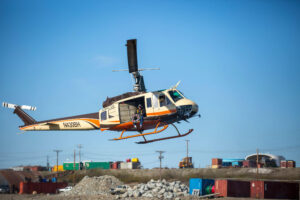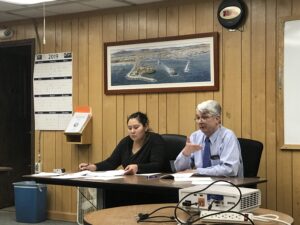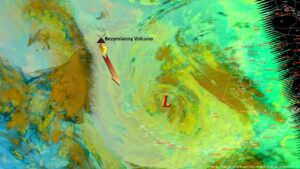Warm temperatures, melting sea ice, ocean debris and permafrost degradation dominated discussion of the 2021 NOAA Arctic Report Card.
NOAA Administrator Rick Spinrad summed up the overall feeling of disquiet.
“The trends are consistent, alarming and undeniable. Rapid and pronounced warming continues to drive the evolution of the Arctic environment. From this year’s report card, we learn that the October to December 2020 period was the warmest Arctic autumn on record dating back to 1900. The average surface air temperature over the Arctic this past year was the 7th warmest on record,” Spinrad said.
Deputy Lead Scientist Twila Moon of the National Snow and Ice Data Center addressed the issue of the Arctic’s rising temperatures specifically, saying the Arctic is warming at more than twice the rate than the rest of the globe.
“This means that the flora, fauna and peoples of the Arctic continue to experience rapid and often dramatic changes,” Moon said.
Moon stressed, however, that it is important not to oversimplify the Arctic ecosystem as one continually warming event. She pointed out that data can vary from location to location, and from season to season, painting a far more complex picture of the Arctic.
Scientist from Environment & Climate Change Canada, Lawrence Mudryk’s presentation touched on melting sea ice. Ice coverage of the Arctic seas has declined greatly over the past few years, according to the report card findings. Notwithstanding a few ups and downs in sea ice extent in the past few years, Mudryk noted that scientists have observed the fifteen lowest extents of sea ice all within the last fifteen years.
Mudryk pointed out that diminishing sea ice contributes to warming Arctic temperatures, not to mention negatively impacts Indigenous peoples who have depended on sea ice for their way of life for centuries.
“Sea ice’s high reflectivity plays an important role in regulating the amount of sunlight that enters the Arctic region and thereby helps to regulate its temperature. As sea ice disappears, the underlying ocean surface is exposed, and this much darker ocean surface will absorb sunlight and thereby allow a lot more heat to enter the Arctic system,” Mudryk said.
Gabriel Wolken, a research professor at the University of Alaska Fairbanks, presented on the state of the Arctic’s permafrost. He dwelt on the degradation of some of the Arctic’s once stable permafrost and the implications these changes have for the plants, animals, peoples and structures housed in a permafrost environment. A greater familiarity with the conditions and locations of permafrost degradation will help scientists identify trends, Wolken said. A sounder understanding translates to a stronger ability to help affected communities navigate the hazards of warming permafrost.
The last presenter, Kaare Sikuaq Erickson of Unalakleet who is with Ikaagun Engagement, ended on a positive statement. Alluding to the way he witnessed his people come together and call upon their traditional values of sharing and cooperation during the ongoing hardships of the COVID-19 pandemic, when access to outside food was limited, Erickson called for cooperation in the Arctic.
“I think people need to put their differences aside and work together on things. The polarization of our society is not helping anything. In the Arctic, we really do have to put things aside and focus on practical solutions. Otherwise, we won’t survive. I think the rest of the world is going to have to face that as well,” Erickson said.
He pointed out that cooperation has been one of the great strengths of Alaska Natives.
“We really did fall back on that kind of communal sharing (and) relations with others in our villages … because these are lifelong dependencies on our neighbors,” Erickson said.
The 2022’s Arctic Report Card will be released at the end of the year.
Image at top: A graph depicting the increase in Arctic warming. Graphic courtesy of NOAA.





